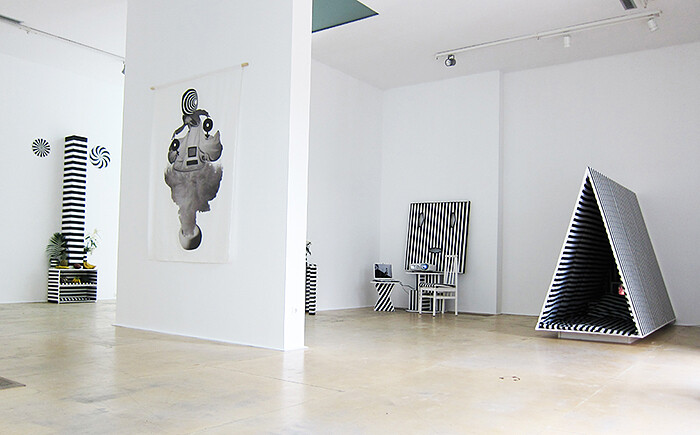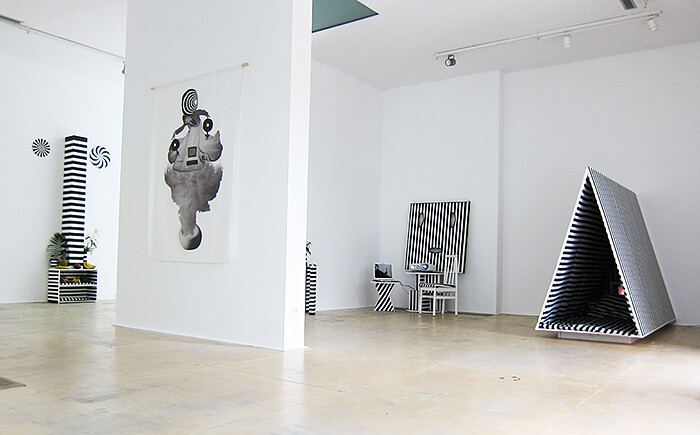Communication is the quest, communication sans barriers. Angelo Plessas’s works form a certain kind of a deliberate “digitally naive” poetry, like a weed within the over-wrought special-effects garden of cyber space. His works are connected with the internet through organic and natural processes—but it’s not that he’s fascinated with technology as such. Most of his works exist as web pages that are projected in the white box environment (on occasion) or on public walls within the city. The domain names of these websites are as much a part of the work as is the content. People can interact with them through their computer, from the couch or wherever they happen to be. Yet, this facility of interaction is not used by the artist as a gimmick. The fact that the works are also to be seen online is just a casual incident. Plessas seems to be a veritable bohemian, rather, who oscillates between fertile constellations and specific locales within the net, no different than a bohemian flâneur, drifting through the streets of Paris. He is a part of a kind of “celebrity neighborhood” where members create freely and dwell in and out of the internet without having to undergo any sense of transition.
In 2007, he founded the ”Angelo Foundation,” a fictional organization that aims to investigate and contextualize the social life of the internet and its relation, or better yet, its parallel existence, to a more physical reality via performances, installations, sculptural objects, and collages. His first solo exhibition at Rebecca Camhi Gallery is the most recent project of that foundation, an installation that includes sculptures, flags, neon, websites, projections, and a program of parallel events based on meditation and other rituals of “self-inspection.” The gallery space has been transformed into a peculiar black-and-white temple with a shrine, icons, sculptures—a sacred space of both confession and seclusion.
This “retro-futuristic” stetting for communal experience aims, according to Plessas, “to present methods of mind and body improvement through creative integration of the offline and online modes.” The concept of the show is based on Extropists’ philosophy. What’s that, you ask? It is a movement that empowers progress and evolution of human values without the intervention of any religious principles, but through the use of science and technology. The Extropists believe that the latter will redefine every human need. Plessas uses the methodology of this rather extravagant new age philosophy as a conceptual device, so as to create a space that accommodates diverse fantasies beyond Extropism itself. He is not into preaching the beliefs of a new way of living based on progress. Instead, he attempts to actively create—in his own words—a “social environment surrounded by ideas and principles that are focused on human beings and their prosperity” through a collage of aesthetic symbols and cultural mannerisms.
Leaving the city behind when entering the space, you definitely feel that you have entered a sanctuary, but not one of a specific religion or ideology. It’s a super-stylized room offering up a variety of ways of contemplation beyond the restrictions of religion, race, sex, age, and socio-economic backgrounds. The black-and-white striped walls and furniture act as a camouflage, providing an entrance into a manipulated cosmos that bears only the traces of the familiar. Like an extension of the simulated environment of digital games—but the avatar here is the physicality of the viewer himself.
A set of beautiful banners featuring collages of nonsensical symbols designed by Plessas and found images from the web, together with a pyramid and other symbolic structures (such as objects simulating tombs and other ritualistic tools) co-exist with projections of websites (like horizonofresemblance.com), which constitute a Sufi-like dance of shapes and motives floating in the free space. The artist’s sarcastic title “The Temple of Truth” is inscribed in neon and hangs on the wall like a sign heralding the threshold of the invisible social-networking altar. (It also provides the password to the gallery’s wi-fi network, no secrecy, no exclusion, free access to this hotspot in all senses of the word).





